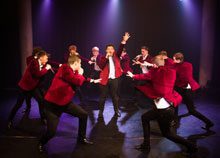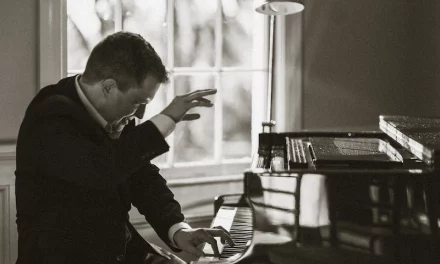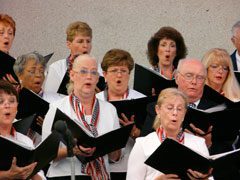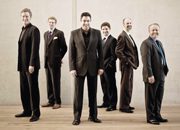Since its first concert season in 2015-2016, presenting a Veterans Dayconcert has become a cherished tradition for the Lowcountry Wind Symphony. Each November the band, under the direction of Donald F. Jemella, has paid tribute to the men and women serving in our military, both past and present, with a program of stirring patriotic music. This is our fifth year, as suggested by the Roman Numeral V.
Saluting America’s Veteran Vwill be presented twice, both north and south of the Broad River. The first concert will be at The Lowcountry Community Church, 801 Buckwalter Parkway in Bluffton, on Friday, November 8 at 7 pm. The program will be repeated on Sunday, November 10 at 4 pm, at Sea Island Presbyterian Church, 81 Lady’s Island Drive in Beaufort.
From the Revolutionary War times to the present, this year’s program will showcase both new and familiar music. Both of these concerts are FREEand open to the public. Donations are always gratefully received.
Musical Director Donald F. Jemella, has chosen several compositions whose melodies will be readily recognizable to our audiences -– “The Stars and Stripes Forever,” “America the Beautiful,” “Battle Hymn of the Republic,” and an arrangement of the Armed Forces service songs-Marines, Army, Navy, Air Force, and the Coast Guard.
This year, LWS will also introduce a number of new works to our audiences:
Chester: William Schuman was a highly respected composer of the 1900s. Among his most successful works is New England Triptych, written in 1956 and based on music by Williams Billings. Billings (1746-1800) is considered America’s first composer of European descent. Among the three Schuman Triptych compositions is Chester, which contains moments of quiet simplicity as well as wild and complex dissonance. Billing’s original tune was adopted by the Continental Army and sung around campfires during the American Revolution. Chester’spopularity remains strong today and is a mainstay in the concert band repertoire.
American Patrol was written by F. W. Meacham in 1885. It incorporates both original musical themes by the composer and melodies from American patriotic songs of the era such as “Columbia the Gem of the Ocean” and “Dixie.” The “patrol” format, heard in this arrangement, was popular in the second half of the 19thcentury, and was intended to represent a military marching band approaching, passing, and fading into the distance.
March of the Mitten Men: Power and Glory, a Sousa march published in 1923, was originally written in honor of Thomas E. Mitten, president of the Philadelphia Rapid Transit Company. Mitten’s company owned Willow Grove Park, where Sousa’s band played every summer for decades. Mitten’s trolleys also carried the audiences to the park. Later Sousa agreed to change the name to ‘Power and Glory’ which sounded more ‘Sousa-ish.’ Melodies heard in the music include Mitten’s favorite hymn, ‘Onward, Christian Soldiers.’
Strategic Air Command: Clifton Williams was an American composer, pianist, instrumentalist, conductor, and educator. He attended Eastman School of Music, where he studied with Howard Hanson. It was Hanson who suggested that he write for wind band rather than orchestra, hoping that by doing so he might reach a larger audience. LWS is such an ensemble, made up of local amateur and professional, wind, and percussion players.
Following the attack on Pearl Harbor, Clifton Williams enlisted in the US Army Air Corp, serving in several bands for the duration of World War II and composing in his spare time. Following the war he taught composition at University of Texas, and then was appointed Chair of Theory and Composition at University of Miami School of Music, remaining there until his death in 1976. He is highly respected composer of wind ensemble and band repertory, much of which is still frequently programmed.
Music by Composer Stephen Melillo: The LWS Veterans Day program features two compositions by Stephen Melillo, who is active in several patriotic and veterans organizations. LWS is proud to perform the world Premiere of ‘Lullaby’and the US Premiere of ‘Forever Strong.’
In ‘Lullaby,’ Melillo surrounds the familiar Brahms melody with a musical message of loving care and support. It is for the heart wrenching concerns of anxious parents, knowing that their sons or daughters are across the seas serving their country in harm’s way.
‘Forever Strong’ commemorates the unbelievable courage and strength of those men who managed to survive the sinking of the US Navy Cruiser Indianapolis, and pays tribute to the heroism of those who were lost at sea. Considered the United States’ worst Naval disaster, theIndianapolis, on a highly secretive mission, was struck by two Japanese torpedoes in the South Pacific in 1945, sinking before it was possible to confirm the May Day message sent out. It had just delivered the materials to make the atomic bomb that would be dropped on Hiroshima. The attack on the Indianapoliscaused the immediate deaths of 300 of the 1,196 on board, as the ship was engulfed in flames and sank in twelve minutes. Nine hundred sailors and officers were thrown into the sea and struggled for their lives in shark infested waters with little hope of rescue. After four days, when the ship was spotted by a plane, help came, but only 317 survived.
‘Forever Strong’ begins with four bells, and ends with musical Morse Code, which spells out ‘US Navy Indy.’‘Forever Strong’is a salute to theUSSIndianapolis, intended by composer Stephen Melillo to be played in 3 minutes and 17 seconds, to honor the 317 survivors.
Please join us for Saluting America’s Veterans V, as together we are Exploring What’s Musically Possible! The LWS welcomes new members, depending on the needs of the wind, brass or percussion sections. If you would like more information, please contact Maestro Donald F. Jemella at djemella@yahoo.com







